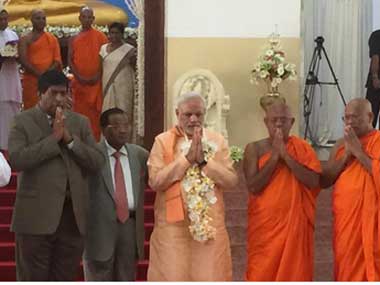Prime Minister Narendra Modi will address the Sri Lankan parliament in Colombo, where he is expected to advocate stronger ties between the two nations. Sri Lanka is the final stop of his three-nation tour of Indian Ocean island nations that took him to Seychelles and Mauritius. [caption id=“attachment_2151953” align=“alignleft” width=“380”]  Modi at the Mahabodhi society in Colombo earlier today[/caption] The Indian Premier landed in Colombo this morning for a two day visit, the first stand-alone bilateral visit by an Indian Prime Minister since 1987. Modi was received by Sri Lankan Prime Minister Ranil Wickramasinghe at the airport following an overnight journey from Port Louis in Mauritius in a special Air India plane. He will be the first Indian Prime Minister and only the second foreign leader after British Premier David Cameron to visit Jaffna in the war-ravaged Northern province, where he will hand over homes built with the help of Indian assistance. Some 20,000 such homes were built in Jaffna described by India as “a flagship cooperation project currently in Sri Lanka”. He is also expected to meet leaders of the Tamil National Alliance and other political parties. Modi is accompanied by National Security Advisor Ajit Doval and Foreign Secretary S Jaishankar.
Live: Modi hails 'new beginning' to india-Sri Lanka ties under Sirisena
Modi landed in Colombo this morning for a two day visit, the first stand-alone bilateral visit by an Indian Prime Minister since 1987.
)
Did Modi just make a gentle push for the 13th amendment to the Sri Lankan constitution? It certainly sounds like it. “Call it my bias, but I have been a Chief Minister for 13 years and a Prime Minister for less than one. I am giving more power to the states. I am a firm believer in cooperative federalism”, he said.
India has been pushing for the 13th amendment, which was introduced to Sri Lanka by then Prime Minister Rajiv Gandhi in 1987. This amendment devolves power to provincial councils, while maintaining Sri Lanka’s ’territorial integrity’. In recent years however, more and more power was being retained with the centre and less power devolved to the states. This was a source of great unhappiness to India.
However Modi was quick to say that India believed in Sri Lanka’s territorial integrity.
“This is new beginning for relations between India and Sri Lanka”, says Modi. ‘I was honoured that Maithripala Sirisena chose India as his first foreign trip and that I was the first foreign leader to visit here after he became President. This is how neighbours should be"
This could well be a reference to the fact that Sri Lanka is only, under Sirisena, turning to India. Mahinda Rajapaksa leaned heavily on China, for both financial and developmental support. China also constantly backed Sri Lanka at the United Nations, where the Rajapaksa administration was under scrutiny for war crimes and human rights violations. China built several expressways in Sri Lanka, a new airport in the South, and have been contributing large sums of money for development. It’s growing influence was seen as a great worry for India, given Sri Lanka’s close geographical proximity to India.
Sirisena’s victory has been seen as a jump start for India – Sri Lanka relations. So much so, that former President Mahinda Rajapaksa has blamed India for his defeat in the Presidential elections.
In fact, Rajapaksa has
Modi is now talking about how India can help Sri lanka. He says that they have committed 380 million dollars to Sri Lanka for the Railways sector. “We want to ensure that Sri Lanka will not fall behind. We see enormous potential to help Sri Lanka in areas like science and technology, rural development health and medicine”.
He also takes the opportunity to push the SAARC satellite that seems to be one of his pet projects.“I hope Sri Lanka takes full advantage of the satellite, which will be launched in December”, he said.
And now finally some great news – if you are a Sri Lankan – visa on arrival for SL nationals.
Some flattery will never go amiss. Modi is now talking about all that he admires about Sri Lanka, saying that it’s human development indexes are a great source of inspiration to India.
He also says that Sri Lanka’s intellectual capital, its development and all that it has achieved is something India is proud of, something that clearly pleases the gathered MPs wh thump their desks in a show of support.
Prime Minister Narendra Modi begins by saying he is bringing wishes from the land of Bodhgaya to the land of ‘Anuradhapura’ – a reference to the shared Buddhist history of the two countries.
Buddhism was introduced to Sri Lanka by King Ashoka of the Maurya dynasty, and his son Mahindra and daughter Sangamitra was said to have encoutered the then king Devanampiyatissa in Anuradhapura.
The buddhism references are flying thick and fast. Modi is highlighting the fact that both countries share deep cultural bonds, and are now both strong and proud countries in their own right.
PM Shri @narendramodi & President of Sri Lanka Mr. Maithripala Sirisena at Joint Press Statement, in Colombo pic.twitter.com/wa8Afc0sNw
— Ministry of Information and Broadcasting (@MIB_India) March 13, 2015
Prime Minister Narendra Modi is expected to address the Sri Lankan Parliament a short while from now. He already made a statement in Colombo, focusing on improving economic ties between the two nations.
PM Modi also focused on the ‘complex’ fishermen issue and said it had been discussed in great detail. He said that fishermen’s associations between the two countries needed to meet and discuss their problems to come to a ‘mutually benificial solution’.
Saying that he was “eagerly looking forward to visiting one of our closest neighbours and a nation with which we share so much”, Modi said, “It (this visit) is the first stand-alone bilateral visit by an Indian Prime Minister since 1987.”


)
)
)
)
)
)
)
)
)
)



